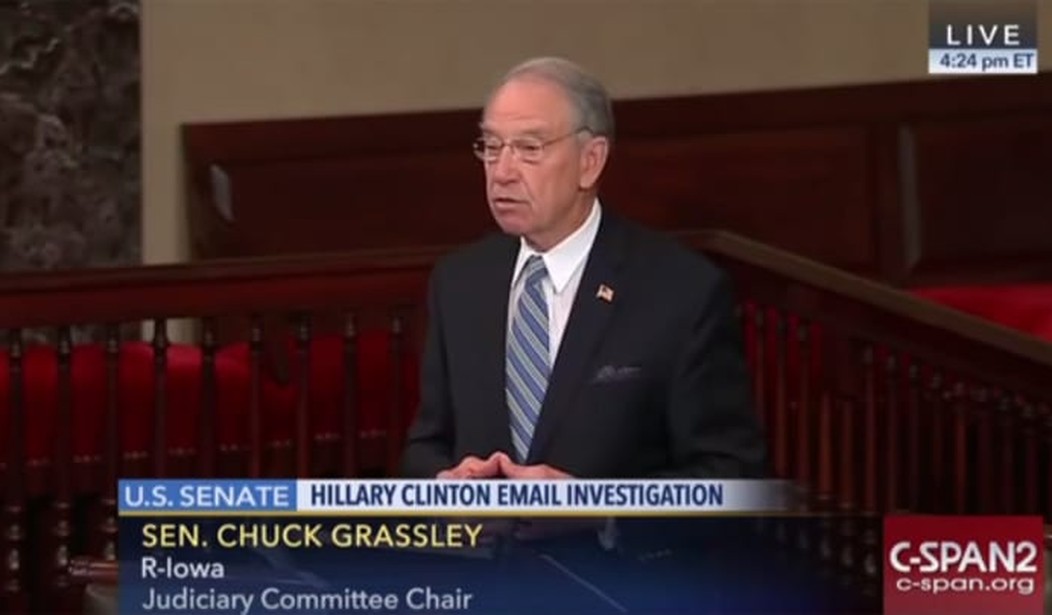Sen. Chuck Grassley is demanding that the FBI release unclassified information from its investigation into Hillary Clinton’s private email server because the cherry-picked portions the public has seen contain “only a very narrow slice of the facts.” The Iowa Republican said in a statement on the Senate floor earlier this week that the summary of the investigation the FBI has released “is misleading or inaccurate in some key details and leaves out other important facts altogether.” Grassley, who chairs the Senate Judiciary Committee, also said that the FBI is keeping a “vise grip” on its investigative files into Clinton’s mishandling of classified information.
One of the key details the FBI is keeping a “vise grip” on concerns the deletion of Clinton’s emails — specifically on whose authority they were deleted, according to Grassley.
On the House side, the FBI declined to surrender all of its files, and the agent it sent to testify before the Oversight Committee refused to reveal their contents. This led Rep. Jason Chaffetz, the chairman of the House Oversight Committee, to slap a subpoena on the FBI during the hearing on live television. “You don’t get to decide what I get to see,” Chaffetz said. “I get to see it all.”
Interested senators have been able to see more. In response to a request from the Senate Judiciary Committee, the FBI sent both classified and unclassified materials to the Senate safe room — but senators who view them are under a gag order that prevents them from discussing what they see.
Fox News’ Judge Andrew Napolitano writes:
The Senate safe room is a secure location that is available only to senators and their senior staff, all of whom must surrender their mobile devices and writing materials and swear in writing not to reveal whatever they see while in the room before they are permitted to enter.
According to Sen. Chuck Grassley, chairman of the Senate Judiciary Committee, the FBI violated federal law by commingling classified and unclassified materials in the safe room, thereby making it unlawful for senators to discuss publicly the unclassified material.
Grassley said in his statement Monday that because the FBI improperly bundled unclassified reports with a small amount of classified information, there are “dozens of unclassified reports describing what other witnesses said” that cannot be seen by the public, and even most congressional staff.
“This is certainly not the ‘unusual transparency’ Director Comey said he would provide,” Grassley said. “In fact, it’s the opposite: unusual secrecy.”
Grassley explained in his statement why he thinks the FBI is being so secretive:
On Tuesday last week, a Boston Globe article wrote about evidence from the publicly-released FBI summary that suggests an engineer for an IT company managing the server may have intentionally deleted emails even though he knew they were the subject of a congressional investigation and subpoena.
The timeline of deletion occurred around a conference call with the engineer, Cheryl Mills, and David Kendall—Hillary Clinton’s lawyers.
Relying on the publicly available information, some have claimed that the engineer deleted the emails on his own volition.
Whether he did so on his own or at the instruction of someone else is a key question.
And, there is key information related to that issue that is still being kept secret, even though it is unclassified.
If I honor the FBI’s “instruction” not to disclose the unclassified information it provided to Congress, I cannot explain why.
Meanwhile, the New York Times has reported that a second computer expert that worked on Secretary Clinton’s server for a contractor was also given immunity by the Justice Department.
The Department of Justice didn’t inform Congress about the immunity deal.
The Justice Department is briefing the New York Times anonymously while refusing to answer questions from its oversight committee about the immunity deals.
And at the same time, it is putting a stranglehold on unclassified documents that describe what these witnesses said to the FBI.
That is the opposite of transparency.
The other witness granted immunity, Bryan Pagliano, pled the Fifth to Congress.
Congress has a right to question these individuals.
They have reportedly received some sort of immunity for their cooperation with the FBI.
The public ought to know what information they provided in exchange for a get-out-of-jail-free card.
The American people deserve the whole truth.
“What is going on here?” Judge Nap asks. “The FBI investigation of Hillary Clinton has not served the rule of law. The rule of law — a pillar of American constitutional freedom since the end of the Civil War — mandates that the laws are to be enforced equally. No one is beneath their protection, and no one is above their requirements. To enforce the rule of law, we have hired the FBI. What do we do when the FBI rejects its basic responsibilities?”








Join the conversation as a VIP Member